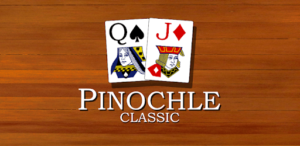Pinochle is another European card game — it developed out of another popular card game (in Europe) called Bezique.
Auction Pinochle
In this article, we will focus on the rules and strategies of Auction Pinochle, though many variations exist, including Two-Handed Pinochle and Partnership Pinochle.
Melds and Scoring in Pinochle
The way you score big points in Pinochle is by forming “melds”. These are the specific meld combinations that will score you the most points in the game of Auction Pinochle:
- Flush (A-10-K-Q-J of trumps), 150 points
- Royal marriage (K-Q of trumps), 40 points
- Plain marriage (K-Q of any other suit), 20 points
- Pinochle (Q-J), 40 points
- Aces (all four Aces), 100 points
- Kings (all four Kings), 80 points
- Queens (all four Queens), 60 points
- Jacks (all four Jacks), 40 points
- Dix (pronounced “deece”) (9 of trumps), 10 points
Auction pinochle has three active players and fourth player, the dealer, who sits out the particular hand he deals.
The Object of Auction Pinochle
The object of Auction pinochle is to form melds and score points. A specific deck is needed, called a Pinochle deck, composed of 48 cards. If you don’t have a Pinochle deck, you can make your own by combining two standard packs (of the same color and design) and leaving out all twos through eights. The rank of cards therefore is Ace down through nine, with Ace the highest and nines the lowest.
Playing Auction Pinochle
Start play by deal fifteen cards to each player. Traditionally, you are supposed to deal in groups of three, though one group of four is usually dealt at the end.
You also must deal three cards at the beginning of dealing to a face down pile of cards, also known as the kitty.
Pinochle Bidding
Bidding starts with the player to the dealer’s left, and each player must either bid or pass.
The lowest possible bid is 250 points, and bids go up in ten point increments after that. Once a player passes that player is not allowed to bid any further, though the other bidders can keep raising the auction value. The auction is “closed” as soon as two players have passed.
The aim of the game, then, is to score at least as many points as you bid during the auction, with no penalty for going over.
The player who wins the bid is called the bidder, naturally. If you are the bidder, turn the three face down cards face up (from the “kitty”) and add them to your hand. A special note — if it is clear after picking up the “kitty” that your total of melds and cards taken won’t reach your bid, you can concede right away. yes, you lose the amount you bid, but you can save yourself some embarassment and maybe a few points as well by conceding a loss.
If you do not wish to concede, table your natural melds and announce the suit of your choice as trump.
If the bidder has already reached or exceeded the value of his or her bid right from the start, play stops and the bidder wins the value of the bid.
The only time a “team” is formed in Auction pinochle is when two opponents join together to try to “set” the bidder.
The winner of each trick leads the next trick. Players must always follow suit, and if you cannot follow you must play a trump if possible.
When a trump is led, you should try to play a higher trump than the previous player. Tricks are taken by the highest card of the suit led or by the highest trump played in a given trick. If two cards “tie”, the first one to be played takes the tie.
Scoring Pinochle
Besides making melds, there are two ways to score in Auction Pinochle — points and bids.
When a round of Pinochle is over, points are counted in tricks like this —
- Aces are worth 11 points
- 10s are worth 10 points
- Kings are worth 4 points
- Queens are worth 3 points
- Jacks are worth 2 points
- 9s are worth no points
- The last trick is worth a bonus of 10 points
If a player makes his bid, he collects points from each opponent according to this schedule —
- If the bid is 250-290, the player earns 5 points per opponent
- 300-340, 10 points
- 350-390, 15 points
- 400-440, 25 points
- 450-490, 50 points
- 500+, 100 points
A special note — when bids are over 300, spades count for double points.
Here’s an example: A player bids 350 and makes 400 in spades. You receive 30 points from each of three opponents.
Pinochle Variations
There are plenty of variations in scoring, bidding, and gameplay rules. This version of Pinochle is the simplest, but depending on how many players you have or what sort of game you want to play, there are plenty of variations of Pinochle available to you.
